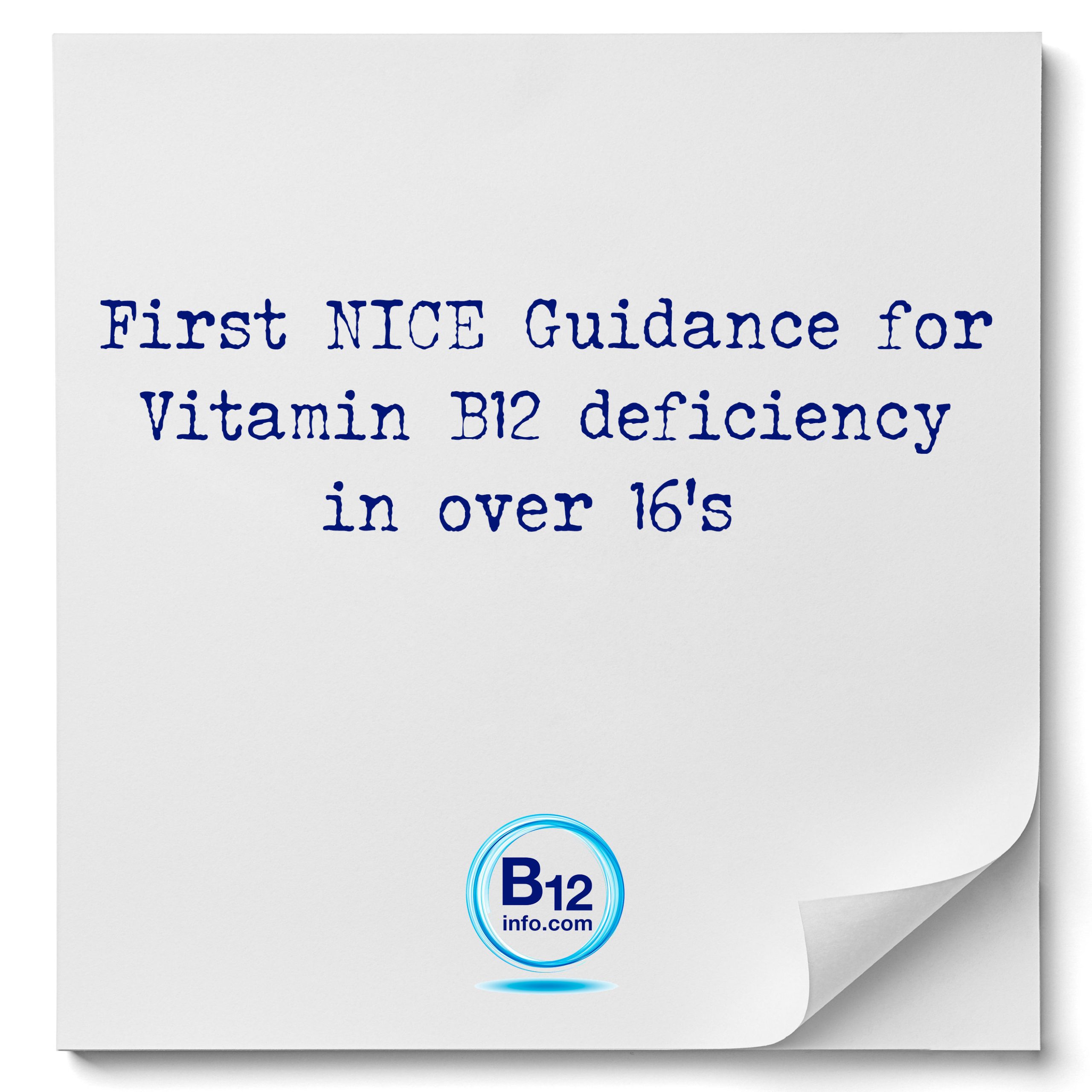As a stakeholder I was able to add my comments and yours to the consultation on the draft guidelines last summer. You can see all the comments and the responses from NICE to them here. The comments I made start at page 18 and end at page 40.
The new overview states:
This guideline covers recognising, diagnosing and managing vitamin B12 deficiency in people aged 16 and over, including deficiency caused by autoimmune gastritis. It also covers monitoring for gastric cancer in people with autoimmune gastritis.
In this guideline, we do not use the term pernicious anaemia to describe autoimmune gastritis. See the definition of autoimmune gastritis in the terms used in this guideline for more details.
On this page you will also find Recommendations..
- recognising vitamin B12 deficiency, including when to test for the condition
- diagnosing vitamin B12 deficiency
- identifying the cause of vitamin B12 deficiency, including autoimmune gastritis
- managing vitamin B12 deficiency
- ongoing care and follow up
- monitoring for gastric cancer in people with autoimmune gastritis
- information and support for people with suspected or confirmed vitamin B12 deficiency.
It also includes the Guideline development process should you wish to take a look…How we develop NICE guidelines
What about children?
I know that it wasn’t just me who was troubled to see that no paediatrician could be found to join the committee in order that the guideline would also cover children.
NICE response to my comment:
Thank you for your comment. It is unfortunate that paediatrics could not be covered in the guideline.
Frequency and loading doses
As you will read there was concern that the frequency and loading doses aren’t mentioned in the Guidance and NICE responded to this concern by stating that this hasn’t changed and will still be found in the BNF – British National Formulary – which is a guide for medical treatment.
I’m concerned that the Draft avoids stating treatment regimes. Loading dose and frequency of injections aren’t mentioned at all in ‘Managing B12 deficiency’. Already GP Practices have developed their own restrictive protocols for treatment which stretch out the loading dose of 6 injections over two weeks to 4 injections over 4 weeks. This is clearly not in line with NICE CKS Summaries which state – Every other day injections for as long as it takes for symptoms to stop improving for those with neurological symptoms.
It needs to be made clear that frequent B12 injections are necessary for recovery from nerve damage caused by lack of B12 and that each patient has a different requirement based on their individual experience. B12 is water soluble and there is no known toxicity. This paper https://onlinelibrary.wiley.com/doi/full/10.11 11/hex.13152 shows just how many people feel about their interactions with their doctor regarding B12 deficiency
Response from NICE:
NICE does not generally include dosages in recommendations where they are available in the BNF or SPC. A dosage may be included if this information is not available, or the committee agrees that there needs to be a change to current recommended dosages, for example because of new evidence. Loading doses are covered in the BNF and therefore not included in the guideline. The guideline did look for clinical evidence relating to the frequency of intramuscular injections however no evidence was identified and the committee made a research recommendation.
The study you cite is included as part of the evidence in evidence review A for information and support.
Self injection
My comment Point 88 page 36:
Sweeping generalisations are often made in terms of care by members of the medical community. There needs to be more emphasis placed on anecdotal evidence from patients who manage their own care self administering B12 injections whether it is subcutaneous or intramuscular. Quite often, patients have to take caring for themselves into their own hands due to the lack of knowledge of doctors who restrict treatment which causes delay in recovery and potential permanent harm.
Throughout this NICE Draft, the lay person does not appear to be represented in the treatment process which leaves much of this report open to interpretation. Please see : https://research.manchester.ac.uk/en/publications/patient-safety-self-injection-and-b12-deficiency-a-uk-cross-secti
Response from NICE:
Thank you for your comment. The guideline review looked for and found no evidence on the effectiveness of self- medication either by intramuscular or subcutaneous injections. There are also no licenced medications for subcutaneous vitamin B12 injections in the UK. The committee agree that self-administration could be beneficial to people with vitamin B12 deficiency, therefore they made a key research recommendation in this area.
So there we are.
Pulse Today
You may remember my previous blog regarding an article from the GP Online publication Pulse Today….They have responded to the new Guidance with this article:
Rubber stamped NICE Guidance will be challenging to implement Here are some excepts below:
New detailed NICE guidelines on vitamin B12 deficiency could lead to more standardised care but will be ‘challenging’ for GPs to implement, Pulse has been told…
Professor Azeem Majeed, a GP and professor of primary care and public health at Imperial College London said the guidelines provided standardised criteria for diagnosing vitamin B12 deficiency, including recognising clinical manifestations and interpreting laboratory results.
‘This could lead to improved diagnosis of vitamin B12 deficiency. By outlining specific treatment regimens, including the dosages and durations for vitamin B12 supplementation, the guidelines could also better standardise care for patients with confirmed vitamin B12 deficiency,’ he said.
And guidance on monitoring requirements and follow-up intervals could also lead to reduced variation in care, he added.
But it would potentially be difficult for primary care teams to implement – including the updated protocols, education and training needed – at a time when the NHS is very stretched, he said.
‘One area that might be challenging is deciding when to use oral versus injected vitamin B12.
‘For people who do need injected vitamin B12, it may be possible to consider self-injection to reduce the workload for primary care teams.’
He also explained that when it comes to people with low/borderline readings in association with no or vague symptoms, many GPs will ‘err on the side of caution’ and recommend vitamin B12 treatment because the risks from under-treatment will be much higher than from over-treatment.
‘Overall, there is a lot to take in and high-quality education will be essential for their effective implementation.’
Dr Paul Evans, a GP in Gateshead, said it was yet more unfunded workload in doing and interpreting tests and prescribing with the potential for high patient demand.
Dr Richard Cook, a GP in Sussex, said the level of detail could potentially be very useful. ‘Like much of the NICE guidance, it is not necessarily designed with GPs in mind, but I often find it useful if I need more detail. Overall, I think it will be a useful adjunct to managing these cases in primary care.’
There are three comments currently at the foot of this Pulse Today article and the first reads:
At the bottom of the list of Common Symptoms, there it is……….
“Unexplained fatigue”
So now every TATT will be expecting a B12 test.
First the Vit D hysteria, now this………..
The second:
Let’s sort out the countless patents who are on B12 injections for absolutely no reason first, wink wink
It would be crazy for us to think that everything in the garden of being a GP is rosy, of course it’s not. The profession is under immense pressure, but patients with B12 deficiency could do without the attitudes above.
We can but hope that diagnosis of this very common and very commonly misdiagnosed condition is made more easily with the publication of the guidance.
Kindness always
Tracey
www.b12info.com


Kindness always : so glad you are there for us.
I have the same concerns as those expressed by you above.
It is unsurprising to see that there are such disparaging remarks added by a few GPs to the Pulse Today article. Sadly, not one GP has pounced on these yet.
GPs must have noticed improvements to health in patients who have started self injecting. Those who have been brave enough to be honest about this, that is – never easy to decide to take this route and support from medical professionals is welcome. Even if it only involves regular monitoring of folate, ferritin etc while not pointlessly retesting B12. There does need to be some admission about the severity of this condition – and the fact that 4 injections a year cannot possibly be of help to every single patient with B12 deficiency.
Symptoms lists – so much missed off. Makes it difficult for GPs to diagnose when they are unaware what we really go through, and difficult for them to understand why so many would rather self inject than cyclically deteriorate on an NHS regime.
Thank you Cheryl, I agree!
Thanks for your summary ( and interpretations) Tracey. as always even if you present them with evidence cost will always be their first consideration. In this case it is not the cost of the drug which is not an issue here but the cost of time in screening, monitoring and treating. If we read between the lines it looks like they are encouraging ppl to treat and monitor themselves?
Thanks Marjorie, lets hope so!
Thank you Tracey as always for your incredibly hard work, .
As we know babes can also suffer from the condition. It is a real shame that doctors are still not recognising PA/B12D, mistreating and under treatment.
Maybe THEY would drop the attitude if they knew that the NHS databases and NHSApp are dangerous. They are not obtaining, retaining, storing and transferring accurate data. One poor Clinical Care Group was left in £12 million of debt because of a dodgy software package. Doctors do have a tendency to read everything they believe on a patient’s Medical Record.
Doctors do also comment on-line. So, that is within the Public domain. One has to be extremely careful because of misinformation, disinformation and mal-information.
Keep up the great work.
xx
Thank you Charlotte!
What a shame it’s not readily available as in Aus. You need to come out for extended holidays. You are amazing Tracey.
Ah thank you Lynne, you are lovely!
Thank you so much Tracey for your work on this. I am always amazed at the attitude from most medical professionals towards Vitamin B12 and cannot understand why it is still being ignored when it could make such a difference to so many peoples health. Thank you for all you do.
Thank you Suzy, the attitude of some still shocks!